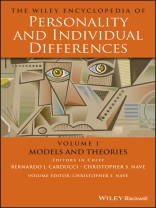Volume 1, Models and Theories of The Wiley Encyclopedia of Personality and Individual Differences
The Encyclopedia of Personality and Individual Differences (EPID) is organized into four volumes that look at the many likenesses and differences between individuals. Each of these four volumes focuses on a major content area in the study of personality psychology and individuals’ differences. The first volume, Models and Theories, surveys the significant classic and contemporary viewpoints, perspectives, models, and theoretical approaches to the study of personality and individuals’ differences (PID). The second volume on Measurement and Assessment examines key classic and modern methods and techniques of assessment in the study of PID. Volume III, titled Personality Processes and Individuals Differences, covers the important traditional and current dimensions, constructs, and traits in the study of PID. The final volume discusses three major categories: clinical contributions, applied research, and cross-cultural considerations, and touches on topics such as culture and identity, multicultural identities, cross-cultural examinations of trait structures and personality processes, and more.
* Each volume contains approximately 100 entries on personality and individual differences written by a diverse international panel of leading psychologists
* Covers significant classic and contemporary personality psychology models and theories, measurement and assessment techniques, personality processes and individuals differences, and research
* Provides a comprehensive and in-depth overview of the field of personality psychology
The Encyclopedia of Personality and Individual Differences is an important resource for all psychology students and professionals engaging in the study and research of personality.
Spis treści
Contributor Biographies ix
Gordon Allport 1
Roy F. Baumeister 11
Jack Block 17
David M. Buss 21
Paul T. Costa Jr. 25
Robert Mc Crae 29
Ed Diener 35
Erik H. Erikson 45
Hans J. Eysenck 51
David Funder 57
Lewis R. Goldberg 63
Karen Horney 67
Carl Jung 73
Abraham H. Maslow 79
Dan Mc Adams 83
Walter Mischel 89
Carl Rogers 95
George Kelly 101
Agreeableness 105
Individual Psychology of Alfred Adler 111
Animal Personalities 117
Conscientiousness 123
Cognitive-Affective Processing System (CAPS) 129
Cattell Trait Theory Lexical Analysis 135
Interpersonal Circumplex 141
Psychodynamic Perspective of Defense Mechanisms 147
Delay of Gratification 153
Extraversion – Introversion 159
Ego Control/Ego Resiliency Theory (ARCH) 165
Emotional Intelligence 173
Erikson’s Stages of Psychosocial Development 179
Evolutionary Theory of Personality 185
Psychoticism 199
Five Factor Model, Facets of 203
Gender Differences in Personality, Evolutionary Perspective on 209
Contemporary Theories of Gender Identity 215
Gene-environment Interaction 221
Goldberg vs Costa/Mc Crae Five Factors 225
Grit 231
Hedonic Adaptation 237
Heritability 243
HEXACO Model of Personality 249
Independent/Interdependent Self 257
Personal Construct Theory of George A. Kelly 263
Maslow’s Hierarchy of Needs 269
Meaning in Life 275
Neuroticism 281
Narrative Approach 287
Openness 293
Optimism/Pessimism Carver and Scheier Theory 299
Personal Projects 305
Personality and Language 311
Personality Stability and Change over Time 317
Personality in Culture 323
Personality Stability over Time 329
Priming 335
Realistic Accuracy Model 341
Rejection Sensitivity 351
Resilience Theory of, Not Just the Trait Dimension 357
Schemas, Theory of 363
Self-Determination Theory 369
Self-efficacy Theory 375
Self-esteem, Theory of 381
Self-Monitoring, Theory of 387
Self-other Interjudge Agreement; Theory of Accuracy 393
Self-Presentation Theory/Impression Management 397
Social Learning Theory/Social Cognitive Theory 401
Terror Management Theory 407
Trait Theory of Allport 413
Whole Trait Theory 417
Index 423
O autorze
Bernardo J. Carducci, Ph D, was professor of psychology at Indiana University Southeast where he taught classes on personality psychology and introductory psychology for 37 years, and was director of the IU Southeast Shyness Research Institute. He authored several books on shyness, including The Pocket Guide to Making Successful Small Talk: How to Talk to Anyone Anytime Anywhere About Anything and Shyness: A Bold New Approach. His text, Psychology of Personality: Viewpoints, Research, and Applications, is currently in its third edition.
Christopher Nave, Ph D, is the Managing Director of the interdisciplinary Master of Behavioral and Decision Sciences program at the University of Pennsylvania. His areas of expertise include multi-method design, behavioral observation, personality stability, personality judgment and well-being. His publications have appeared in top academic journals and handbooks and have been featured in the popular press.












